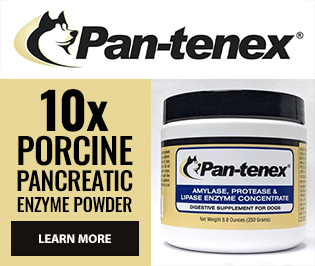Understanding High-Protein Diets for Dogs on Digestive Enzymes
For dogs that require digestive enzymes, diet plays a key role in how well the supplement works. High-protein dog foods have become increasingly popular, especially among pet owners focused on muscle development, energy, and grain-free nutrition. But are these diets suitable for enzyme-dependent dogs?
How Enzyme Support Interacts with High-Protein Meals
Digestive enzymes help break down proteins, fats, and carbohydrates. When a dog is on a high-protein diet, a supplement like Pan-tenex becomes especially important. It supplies concentrated levels of protease, which aids in the breakdown of protein into usable amino acids.
Without enough enzyme activity, high-protein diets can overwhelm the digestive system. This may lead to large or loose stools, excessive gas, or signs of discomfort after meals. If your dog eats a protein-rich diet and still shows signs of poor digestion, enzymes may help improve nutrient absorption and overall gut function.
When a High-Protein Diet May Not Be Ideal
While many dogs do well on higher protein levels, it may not be the best fit for every enzyme-dependent dog. Consider the following factors:
- Pancreatic stress: Too much dietary protein can be tough on dogs with existing pancreatic issues.
- Age and lifestyle: Older or less active dogs may not need as much protein as working or athletic breeds.
- Stool quality: If stool remains greasy or loose, the protein content may be too high or not fully digested.
For more on this, see Loose Stool in Dogs: What It Means & How to Help and Excessive Gas in Dogs: Causes and Enzyme Solutions.
Balancing the Diet for Better Digestion
Instead of focusing on protein alone, aim for a balanced diet that meets your dog’s nutritional needs without overloading their system. Low-fiber, moderate-fat, and well-sourced ingredients can often improve stool quality and digestion. Learn more in Best Diets for Dogs Needing Digestive Enzymes: Low-Fiber Options.
Always monitor how your dog responds when you introduce a new food. Use our Dog Enzyme Digestive Health Stool Tracker to log changes in stool consistency, appetite, and energy levels during the first week of a new diet or enzyme routine.
Work with Your Vet for the Right Plan
Diets should be personalized. Your dog’s size, medical history, and current digestive health all matter. Dosing may vary by product and meal size, so it is important to read the instructions carefully. As with any supplement, enzymes should only be given on the recommendation and under the supervision of a veterinary professional.
If you’re unsure how to balance enzyme dosing with a high-protein diet, or how much to feed at each meal, check out our Feeding Guidelines or browse more Pan-tenex Help Articles.
Final Thoughts
High-protein diets can work well for dogs on digestive enzymes when properly balanced. Pan-tenex provides the extra digestive support needed to break down these protein-rich meals effectively. Watch your dog closely, and don’t be afraid to make changes (slowly) if their stool or appetite indicates a need for adjustment.
For questions about enzyme compatibility with your dog’s diet, contact us. We’re here to help.

